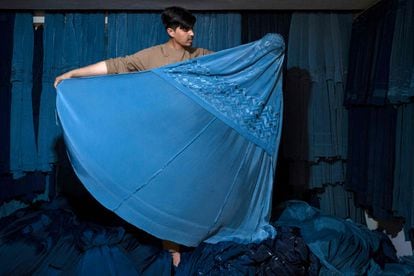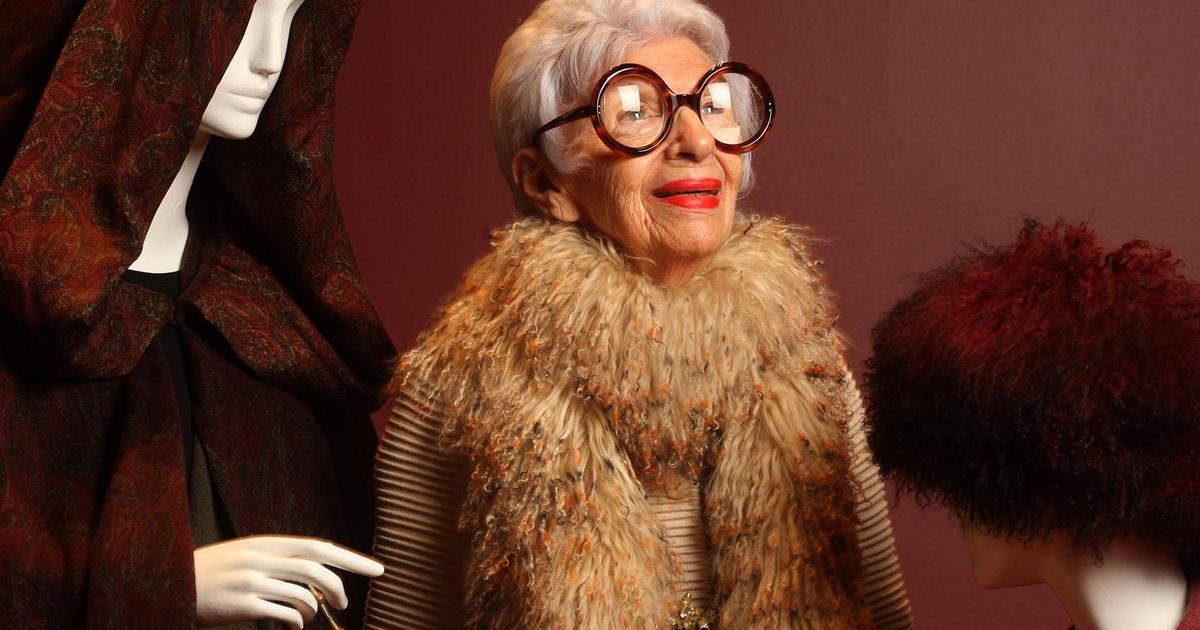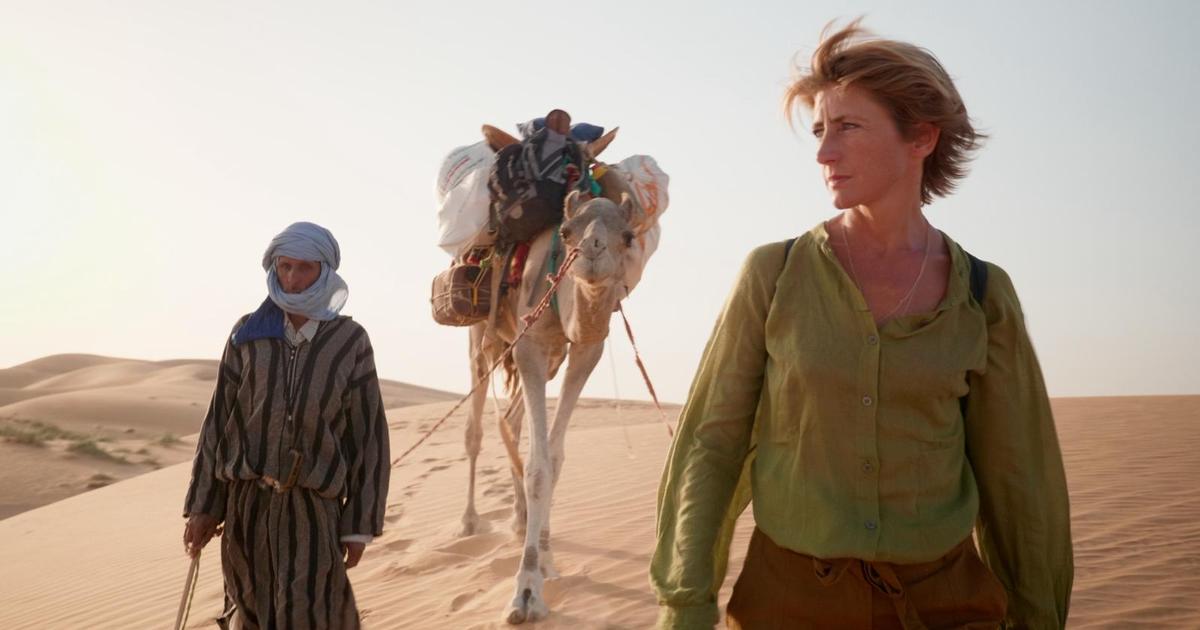“The burqa is a cage.
It is violence against women.
We will not take it again.
I'd rather go to jail than put it on again."
Marghalar Faqirzai, 44, reacts with horror to the new imposition of the Taliban government, which last week decreed that women must cover their faces in public.
Faqirzai knows what she is talking about, she was a teenager during the previous Taliban regime (1996-2001) when the burqa became a symbol of repression in Afghanistan: “Inside the burqa I felt trapped.
Imprisoned in a cell without doors or windows.
It's dark, you can only look through a small hole.
When I got rid of him I took a deep breath.
And I felt alive."
Twenty years later, she feels that the same extremists want to bury her alive again.
Before the Taliban takeover in August last year, Faqirzai worked in the Afghan Interior Ministry.
"Now I am a prisoner in my house with my children," says the woman who lives with two 20-somethings, a boy and a girl, who dropped out of university after the fall of the government, and a girl who can no longer attend high school.
"It's very hard, we are all experiencing psychological problems," she explains.
But something has changed.
“If we accept the imposition, we will have lost.
And we can't lose, I have to prove it to my children.
We will not accept the Taliban law again.”
Despite initial promises of openness, for eight months the Taliban have limited the lives of women and girls with various decrees that prohibit attending secondary school, working except in certain positions, traveling more than 70 kilometers or on a plane without a male companion, get a driver's license or even visit the doctor alone.
Last Saturday, May 7, the Ministry for the Propagation of Virtue and the Prevention of Vice (which took the place of the former Ministry of Women's Affairs) issued an edict by ultra-conservative leader Hibaitullah Akhunzada forcing women to cover your face in public places, preferably with a burqa whose only opening is a mesh at eye level.
In Kabul, wearing a burqa is inconceivable for women of all ages.
Freshta Ali Yar, 18, could never have imagined the turn her life would take as she prepared for her entrance to university.
"When the Taliban arrived I lost all my dreams, I wanted to be a doctor, fend for myself, serve others, make my family proud... Now my life is bitter, I was free and I've been locked up at home for months, I can't even decide what put.
I feel mentally ill, I think I have depression, they have taken my future ahead.
“I was 18 years old in 1996, when they forced me to wear a burqa,” says Aina, who prefers not to use her name.
“If you could see your feet, they would whip you, you had to put on socks and hide your hands.
I was flogged, interrogated and humiliated several times.
The burqa does not let you breathe, you do not see where you are going.
It's unbearable to think about putting it on again.
We cannot accept it."
A group of women demonstrated last Tuesday in Kabul against the imposition of the burqa.
"Don't take women hostage," reads one of the banners.
STRINGER (EFE)
Following the announcement, burqa sellers raised their prices by up to 30%, according to the Reuters news agency, but lowered them again throughout the week given low demand (a burqa costs about 1,300 Afghanis, 14 euros).
Despite intimidation by armed Taliban, several women's groups demonstrated with banners in Kabul.
"The Taliban have not changed, they are still the same savages," says Maryam Hassanzadeh, 24, who participated in one of the protests.
“The difference is that this time we women will not remain silent.
We are no longer the same as before, we will not tolerate this oppression.
We know our rights, we have enjoyed them for 20 years, we have seen the fruit of our efforts.”
Until the arrival of the fundamentalists, Hassanzadeh was a clerk in the Ministry of Education.
“First they took our jobs away from us, now they want to take away our identity”, he says, “we don't have the right to work, to participate in politics, or even to decide our personal life;
if the situation continues, women will only be used for reproduction and service.”
“This is why we take to the streets”, she continues, “we will raise our voice, the Taliban have to know that we are no longer the women they knew”.
For this activist, women have become a political tool: “We are hostages of the Taliban;
They use us to attract the attention of the international community.”
“This is why we take to the streets”, she continues, “we will raise our voice, the Taliban have to know that we are no longer the women they knew”.
For this activist, women have become a political tool: “We are hostages of the Taliban;
They use us to attract the attention of the international community.”
“This is why we take to the streets”, she continues, “we will raise our voice, the Taliban have to know that we are no longer the women they knew”.
For this activist, women have become a political tool: “We are hostages of the Taliban;
They use us to attract the attention of the international community.”
On Thursday, five days after the Taliban's announcement, the UN Security Council held an emergency meeting to discuss joint action against the imposition of the burqa.
Although the resolution is still pending consensus, some of the participants declared to the media that the situation of Afghan women is “unsustainable”.
The British representative to the United Nations, Barbara Woodward, explained that before the Taliban took over, 3.6 million girls were in school, a quarter of Parliament was occupied by women and they constituted 20% of the country's workforce.
"Now the Taliban want to eliminate all of that," she said, emphasizing that women should not accept "a life banished to the margins."
Gender violence and censorship
Meanwhile, in Kabul, women deal with their day to day as best they can.
For Susan Hamidi, 23, a married mother of a baby, the burqa is "unacceptable."
"Even if it costs me my life, I'm not going to wear it," says this lawyer who worked in a private company.
"I've spent a fortune educating myself for years and now it's useless," she laments.
“I will not allow my human right to be free to be restricted.
I will fight until my last drop of blood.”
For the lawyer, the situation of women is "as bad as the previous time", since "restrictions grow every day and gender violence has increased".
"Many families think like the Taliban and openly oppress their women, they know that no one will pay attention to them," she denounces.
“If this continues like this we will not be able to tell what is happening, the Taliban have learned to play politically,
what they say to the media is very different from what they do, I myself have refused interviews because they dictate to me the topics that I cannot talk about, they censor us.
Life has become a prison."
Mina, a 22-year-old student of Social Sciences, who prefers not to give her name, survives what she considers "incomprehensible" from another place: "In the end you submit to the restrictions imposed because you have no other way to achieve your goals, we must continue forward, fight for a better future.
Although if this continues like this, I don't finish seeing that future…”.
She attends her university classes, "but as the Taliban dictate."
“I can no longer participate in social activities, art classes or student meetings, although they were not political and did not harm anyone;
we girls go to class three days a week so as not to coincide with our classmates, and we have to go fully covered”.
"My desire is to work just like men," she says.
An Afghan vendor displays a burqa at his shop in Kabul's Mandawi market on May 8.
WAKIL KOHSAR (AFP)
Fatameh Mohammadi, a 23-year-old computer science student, has set up a sewing workshop for some 40 women who lost their jobs when the Taliban arrived.
“They were the providers for their families, their economic situation is dire, they have lost their homes,” she says.
Fatameh tries to be “a window of hope for them”: “We work together so that they can at least cover their most basic needs, it is my way of serving the community”, she continues.
“Our dreams have been shattered.
Our hope is limited to getting a piece of bread, ”says the activist Hassanzadeh.
Beyond the burqa, many women are the heads of their families and are fighting hunger.
"The economic problems are brutal," she continues, "and the country is in the hands of a few illiterate people who know nothing about anything, I see the Taliban coming down from the mountains... And they are the ones who govern us."
International organizations denounce that at least 23 million of the almost 40 million inhabitants of the country suffer from hunger, with nearly nine million one step away from starvation.
The seven interviewees insist on the idea that the invisibility of women will plunge their country even further into misery and that the struggle must be collective.
They also insist on the emotional and psychological damage that the new measure entails personally, and that the burqa is not part of their tradition or culture.
“According to Islam, Afghans have always advocated the wearing of the hijab [scarf that does not cover the face],” says Mina.
"For me, wearing a burqa is like putting a bag over my head," says Hamidi.
The leader who has imposed the burqa, Hibaitullah Akhunzada, rarely leaves southern Kandahar, the heart of Taliban conservatism, where the garment is more widespread than in the cities.
His strict view of Islam is mixed with the tribal traditions of the area, which defend, for example, the marriage of girls when they reach puberty.
The edicts against women's rights have been sometimes erratic and depend in many cases on regional governments, being stricter in rural areas.
Since the arrival of the Taliban in government, there has been a certain gap between the more pragmatic and the more hard-line wing, which widened further in March with the decision of the latter to ban secondary education for girls on the same day that the lessons.
A crack, which according to some analysts,
Follow all the international information on
and
, or in
our weekly newsletter
.
Exclusive content for subscribers
read without limits
subscribe
I'm already a subscriber


/cloudfront-eu-central-1.images.arcpublishing.com/prisa/KA3LQ5ZEAFEQXOIZXJEEVDUZUQ.jpg)



/cloudfront-eu-central-1.images.arcpublishing.com/prisa/BLYUJBPZE5HWFP3B5QYDATMI7I.jpg)


